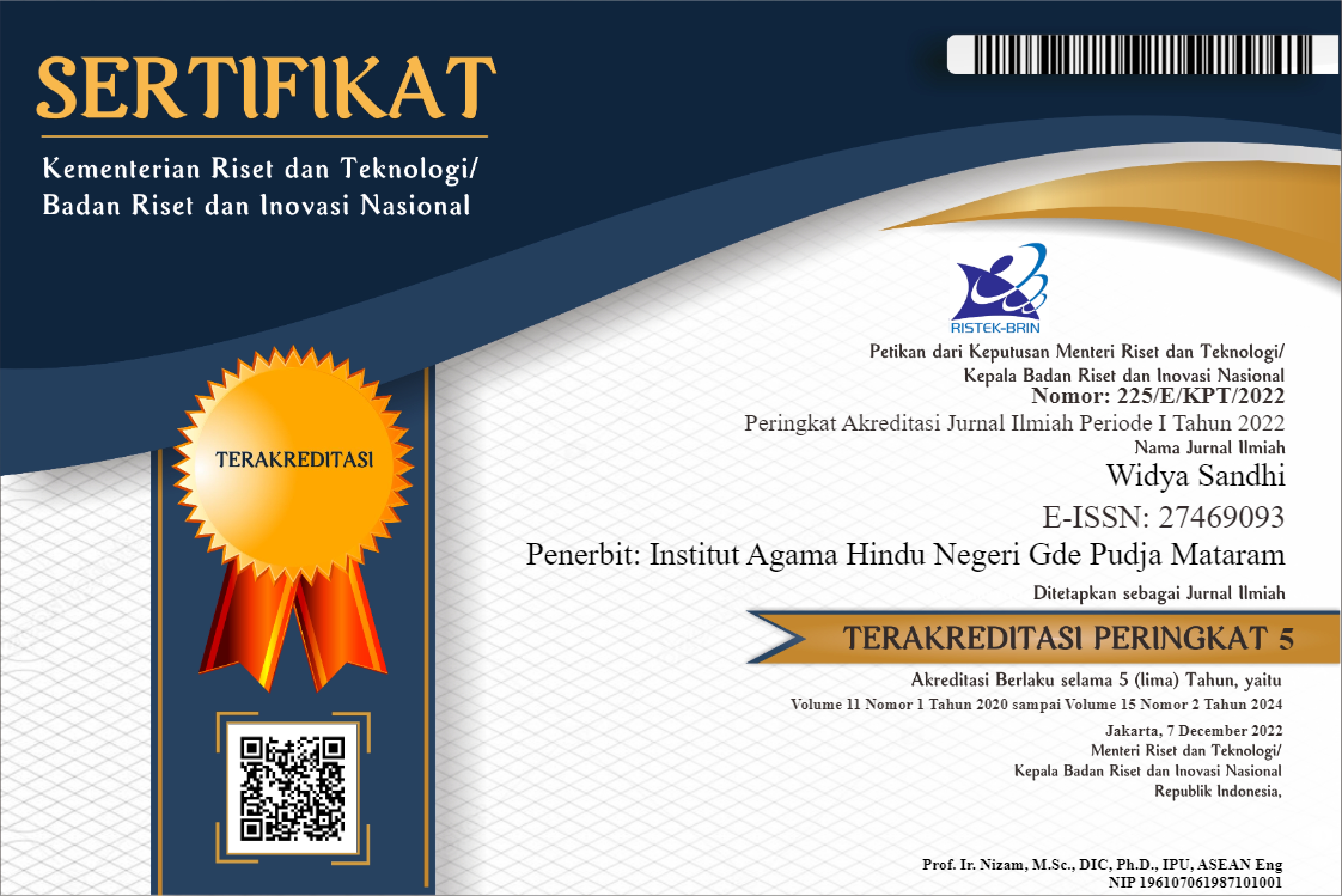Nilai Multikultural Pada Masyarakat Sosio-Religius Pasca Konversi Agama Di Desa Lokapaksa Kecamatan Seririt Kabupaten Buleleng-Bali
Abstract
This research is one of the studies that focuses on Multicultural Values in Post-Religious Socio-Religious Communities in Lokapaksa Village, Seririt District, Buleleng Regency. Where there is a religious conversion and post-religious conversion does not cause conflict, people can even live in harmony. The purpose of this study is to explain how multicultural values are in post-religious conversion communities in Lokapaksa village. In explaining the formulation of the problem then using the functional structural theory. This type of research is qualitative research with primary and secondary data. Collecting data by observation, interviews, documentation, and literature study. Then the data is analyzed and presented. The data obtained is that the post-religious conversion of the Lokapaksa village community shows that there are multicultural values implemented by the people in the Lokapsa village such as openness values, democratic values, pluralism values, human values and nationalism values.
References
Atmadja, N. B. (2010). Ajeg Bali; Gerakan, Identitas Kultural, Dan Globalisasi: Gerakan, Identitas Kultural, Dan Modernisasi. LKIS Pelangi Aksara.
Cakranegara, J. J. S. (2022). TOLERANSI KEHIDUPAN UMAT BERAGAMA DI BALI DALAM PERAYAAN HARI RAYA NYEPI PADA AWAL ABAD XXI. Widyadewata, 5(1), 27-39.
Connolly, Peter. 2012. Aneka Pendekatan Studi Agama. Yogyakarta: LkiS.
Dewantara, Agustinus W. 2017. Diskursus Filsafat Pancasila Dewasa Ini. Yogyakarat: Kanisius.
Gata, I Wayan. 2021. Konversi Agama Di Desa Lokapaksa Kecamatan Seririt Kabupaten Buleleng (Perspektif Sosial Keberagaman). Jurnal Mahasiswa Filsafat Hindu, Vidya Darśan Volume 2 No 2. Mei 2021.
Kaelan. 2009. Filsafat Pancasila. Yogyakarat: Paradigma
Mubarrak, H., & Kumala, I. D. (2020). Diskriminasi terhadap Agama Minoritas: Studi Kasus di Banda Aceh. Seurune: Jurnal Psikologi Unsyiah, 3(2), 42-60.
Muliana, I. K. A. (2021, April). Inklusivisme Dalam Perspektif Agama Hindu. In Prosiding Seminar Nasional IAHN-TP Palangka Raya (No. 2, Pp. 158-170).
Pudja, Gede. 2023. Kitab Suci Bagawad Gītā. Surabaya : Paramita
Putra, I. W. S. (2021). Realisasi Ajaran Teologi Sosial Melalui Tradisi Ngejot di Masa Pandemi Covid-19. Sphatika: Jurnal Teologi, 12(2), 159-167
Putra, I. W. S. (2022). Rekonstruksi Sidikara Pada Masyarakat Bali Sebagai Praktek Ajaran Teologi Sosial. Jnanasiddhanta: Jurnal Teologi Hindu, 3(2), 185-194.
Raka, I. N., & Sudarsana, I. K. (2018). Konversi Agama: Dampak dan Makna Bagi Masyarakat Pakuseba. Jayapangus Press Books, i-132.
Santosa, Slamat. 2010. Teori-Teori Psikologi Sosial. Bandung. PT Refika Aditama.
Setiawan, Z. (2014). Implementasi Dan Internalisasi Nasionalisme Dalam Tradisi Masyarakat. Jurnal Ilmu Politik Dan Pemerintahan, 1(4), 411-4
Suacana, I. (2011). Budaya Demokrasi Dalam Kehidupan Masyarakat Desa Di Bali. -.Jurnalkajian Bali.
Titib, I Made. 2006. Weda Sabda Suci. Surabaya: Paramita
Wakono, Abidin. Dkk (2018) Pengantar Multikultural. Yogyakarta: Cantrik Pustaka
Wirawan, I Made Adi. 2011. Tri Hita Karana. Surabaya : Paramita

This work is licensed under a Creative Commons Attribution-NonCommercial-ShareAlike 4.0 International License.
Authors who publish with this journal agree to the following terms:
- Authors retain copyright and grant the journal right of first publication with the work simultaneously licensed under a Creative Commons Attribution-ShareAlike 4.0 International License. that allows others to share the work with an acknowledgment of the work's authorship and initial publication in this journal.
- Authors are able to enter into separate, additional contractual arrangements for the non-exclusive distribution of the journal's published version of the work (e.g., post it to an institutional repository or publish it in a book), with an acknowledgment of its initial publication in this journal.
- Authors are permitted and encouraged to post their work online (e.g., in institutional repositories or on their website) prior to and during the submission process, as it can lead to productive exchanges, as well as earlier and greater citation of published work (See The Effect of Open Access).






.jpg)




